| Srl | Item |
| 1 |
ID:
121198
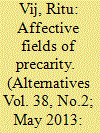

|
|
|
|
|
| Publication |
2013.
|
| Summary/Abstract |
This article explores the affective structure of precarity and its gendered antinomies. Building on feminist critical engagements that call attention to the elision of reproductive and household labor in emergent theorizations of precarity, it draws on Lauren Berlant's work on affective attachments to offer a reading of cinematic narratives of precarity in contemporary Japan, a space only tangentially referenced in a largely Euro-American discourse on precarity. Delineating precarity as an affective field of intelligibility, both inimical to yet potentially enabling of a feminist opening, this article offers an analysis of two films: Japan a Story of Love and Hate shows how the affective normalization of women's precarity privileges the affect of loss for men in precarity, suggesting it is the loss of mastery entailed by the movement of men from once secure to insecure work that mobilizes an affective-political turn under the sign of precarity; in contrast, a reading of Tokyo Sonata as an allegorical treatment of precarity shows how the feminization of men wrought within precarity can open up the possibility for a normative rupture of prevalent gendered hierarchies.
|
|
|
|
|
|
|
|
|
|
|
|
|
|
|
|
| 2 |
ID:
121197
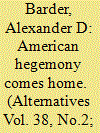

|
|
|
|
|
| Publication |
2013.
|
| Summary/Abstract |
International theorists have long argued over the longevity of American hegemony and whether or not the American-centered international order is currently in crisis. What remains largely missing in many of the analyses of the history and present of American hegemony is an examination of how maintaining global hegemony affects or has affected domestic American political and economic institutions. Looking back at the early 1970s, I examine the nexus between the crisis of American global hegemony in the aftermath of the Vietnam War, the project of neoliberalization in Chile and how the Chilean socioeconomic "laboratory" set an important precedent for the subsequent adoption of neoliberal reforms in the United States under the Reagan Administration. The reassertion of American hegemony was coextensive with a neoliberal project that was initially experimented with in Chile under the authoritarian rule of Augusto Pinochet.
|
|
|
|
|
|
|
|
|
|
|
|
|
|
|
|
| 3 |
ID:
121201
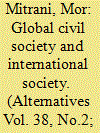

|
|
|
|
|
| Publication |
2013.
|
| Summary/Abstract |
The use of the concept of "global civil society" (GCS) acknowledges the intensifying role of non-state civic actors in world politics and expresses the emergence of a unique social sphere transcending national boundaries. Extensive literatures strive to suggest conceptualizations and assessments of the actual and desired effects of GCS. Nevertheless, relatively little attention has been given to the interplay between the emerging sphere of a GCS and the traditional sphere of international or interstate interactions. This article examines the idea of GCS through an exploration of the conceptual interplay between the notions of GCS and the interstate system. It presents a typology of three possible ideal-type relations: (1) GCS as replacement of statist features of the international system; (2) GCS as opposition to the state system; and (3) GCS as subsidiary organ to the international society. From a perspective informed by the English School of international relations theory, the article argues that the enhanced role of GCS in world politics is a result of international society's attempts to adapt interstate rules and practices to the context of globalization.
|
|
|
|
|
|
|
|
|
|
|
|
|
|
|
|
| 4 |
ID:
121200
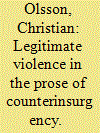

|
|
|
|
|
| Publication |
2013.
|
| Summary/Abstract |
Drawing on a critical engagement with the claims made by (and interpretations of) the 2006 US army and marine corps field manual on "Counterinsurgency," this article engages some of its underlying concerns with the problematic relation between violence, legitimacy, and political order. Since this manual draws heavily on many commonplaces of contemporary political science, the analysis explores their problematic presuppositions and the ways in which they play out in contemporary warfare. The primary conclusion is that while the encounter of legitimacy and violence is claimed by the doctrine to produce and maintain political order, its framing of this encounter is deeply rooted in a specific political order, that of the modern state, which severely constrains the conditions under which this encounter can take place. These constraints cast serious doubts on many of the doctrine's assertions, especially as they have shaped recent wars in Afghanistan and, until recently, in Iraq.
|
|
|
|
|
|
|
|
|
|
|
|
|
|
|
|
| 5 |
ID:
121199
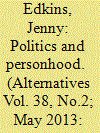

|
|
|
|
|
| Publication |
2013.
|
| Summary/Abstract |
The faces of the missing are held aloft on placards in demonstrations or posted on walls in the aftermath of disappearances. They appear massed on the pages of newspapers and in the displays of genocide museums. Often nothing more than family snapshots given a public place, such images can be compelling. Although photographs of atrocity and war have frequently been discussed, little attention has been paid to these other images: images that do not show suffering but still seem, at least potentially, to be politically effective. How do these photographs work? What form of personhood do they instantiate and what politics do they point to? How are they different from other photographs? This article examines what might be special about a photograph, especially a photograph of a face, and how its political impact might be understood. Drawing on Lacanian psychoanalytic concepts of trauma and subjectivity, the article suggests that a photograph embodies in its very temporal structure a personhood that is inimical to contemporary structures of sovereign power. The destabilizing political potential of a photograph, like that of certain forms of literary text, could be understood as arising from its potential as an encounter with the trauma that inhabits sovereign power and sovereign subjectivity but that is generally concealed. The account presented offers an alternative approach to the analysis of the politics of a photograph and gestures toward other manifestations of personhood and politics.
|
|
|
|
|
|
|
|
|
|
|
|
|
|
|
|